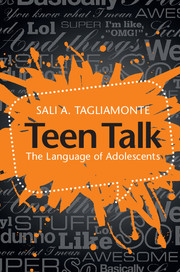Book contents
- Frontmatter
- Dedication
- Contents
- List of figures
- List of tables
- Preface
- 1 What's all the fuss about teen language?
- 2 Teens talking
- 3 Methods: how to tap teen language?
- 4 Quotatives: I'm like,“Oh my God!”
- 5 Intensifiers: upping the ante – super cool!
- 6 How do you start a sentence?
- 7 Sentence enders: finish with a flourish
- 8 Generics: stuffology
- 9 Just: just what?
- 10 Adjectives: the good, bad, and lovely
- 11 Other funky teenage features: You know what? I dunno. Whatever!
- 12 Internet language: everyone's online
- 13 Are they always going to talk like that?
- Notes
- References
- Author index
- Keyword index
13 - Are they always going to talk like that?
Published online by Cambridge University Press: 05 June 2016
- Frontmatter
- Dedication
- Contents
- List of figures
- List of tables
- Preface
- 1 What's all the fuss about teen language?
- 2 Teens talking
- 3 Methods: how to tap teen language?
- 4 Quotatives: I'm like,“Oh my God!”
- 5 Intensifiers: upping the ante – super cool!
- 6 How do you start a sentence?
- 7 Sentence enders: finish with a flourish
- 8 Generics: stuffology
- 9 Just: just what?
- 10 Adjectives: the good, bad, and lovely
- 11 Other funky teenage features: You know what? I dunno. Whatever!
- 12 Internet language: everyone's online
- 13 Are they always going to talk like that?
- Notes
- References
- Author index
- Keyword index
Summary
I'm just thinking 'cause like when I think of stuff as far as like music and culture or like ah like trends and stuff like that, I always think of like I don't know the States and LA and New York and stuff like that.
(Brent Kim, 21)I have now investigated a host of words, phrases, and constructions that are typical of teen language at the turn of the twenty-first century. Given the findings and results and observations from each of the chapters, what does it all mean?
It should now be apparent that teenagers are not the ones to blame for variation and change in language. Language change is part of language itself. Every generation is different from the last and will be different from the next. Do teenagers use slang? Yes, but so does everyone else, at least some of the time. You have only to notice the many examples from the more elderly individuals in this book. It is even the case that a person will criticize teen language and then use that very same form him- or herself (see Gabrielle Prusskin's quote on page 34). What is slang anyway? It depends on what is included in the group of phenomena called slang at any given point in time. Such words and phrases are typically called “mistakes.” However, language mistakes are not in teenagers; the mistake is in human nature. Who decides what is right and wrong? The only thing that makes a word “lazy,” “sloppy,” or “bad” is how society views it. The value judgment is social and historically time-stamped. What was once slang can as easily become the grammar of the next generation or it can fade into dated oblivion like hwæt, whom, shall, or groovy.
When I identified the funky features of teen language at the beginning of the book it may have seemed that they were all the same type of thing – the wacky things that kids say. In fact, they are actually a highly variegated group of linguistic phenomena. Most of them are developments that can be tracked back into much older populations; some have their roots hundreds of years in the past. Some of them are innovative extensions from what has come before. In rare cases words emerge and cover vast distances in time and space in a generation or two.
- Type
- Chapter
- Information
- Teen TalkThe Language of Adolescents, pp. 256 - 266Publisher: Cambridge University PressPrint publication year: 2016

